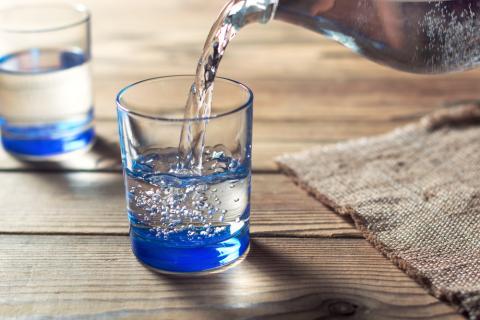
Summer is upon us folks in the Northern Hemisphere. Soon the temperatures will be on the rise. It's time to check in with your daily habits and see if you are consuming enough water to stay hydrated. Keep reading to discover the scientific-backed health benefits of consuming water and how you can benefit from increasing your intake.
While there is no “one-size-fits-all” when it comes to shoes, coffee orders, or nutrition, it is important to remind ourselves that this applies to other aspects of our lives as well. Consuming four liters of water may be too much for one person, but could be just right for another, based on many factors that affect our level of hydration. Every day is variable, too, just as life is unpredictable. Our environment, climate, metabolism, clothing, and amount of exercise are only a few conditions that influence how much water we should consume on a daily basis. Other biological factors may also weigh in if you are pregnant or breastfeeding.
How much do you need to drink to stay hydrated?
How much fluid does the average, healthy adult living in a moderate climate need to consume daily to stay active and energetic? The National Academies of Sciences, Engineering, and Medicine established a sufficient daily fluid intake:
- about 15.5 cups (3.7 liters) of fluids for men
- about 11.5 cups (2.7 liters) of fluids for women
These recommendations account for water, other beverages, and food. Coffee and other caffeinated beverages often have the adverse effect and it should be taken into account that they serve to dehydrate the body. While we may not think of food as being a significant source of hydration, it is interesting to discover that about 20% of our fluid intake does in fact come from the foods we ingest. Some prime examples of foods with a high concentration of water are cucumbers, iceberg lettuce, watermelon, tomatoes, celery, radishes, and spinach. This list is not inclusive, but it gives you a good idea of go-to sources outside of the good, old fashioned cup of water that you can turn to in order to stay hydrated in the height of summer.
While some of this produce is not high in nutrient content, it is low in calorie, considering the variable water content. If you are not keen on sipping on water all day long, perhaps incorporating one or two of the above-mentioned, plant-based foods into a smoothie or salad will do the trick and push you over the daily recommended intake and help you feel comfortable and properly hydrated.
How can I tell if I’m dehydrated?
When you are consuming adequate amounts of water on a consistent basis, you can expect you urine to be light yellow if not clear. Other signs you are filling your body full of the right kind of foods and beverages will be clearer, more radiant skin; healthy metabolism and digestion; improved sweat production; and overall energy.
Here is a list of what to watch out for and take note of when it comes to staying hydrated. These factors may cause you to feel thirsty, have a headache, or get chapped lips, early indicators of dehydration.
Environment & Dehydration
From temperature to humidity, the weather can play a big part in how we feel and how much fluid we need to consume to stay hydrated throughout the day. Even the dry heat of a home in the dead of winter may cause us to become parched and make it a necessity to keep the water bottle handy.
Travelling? Dehydration can also occur in-flight, high over the Atlantic, or on the summit of tall mountain tops. Altitudes greater than 2500m may trigger increased urination and more rapid breathing. These factors may also lead to fluid losses.
Sickness & Dehydration
Have you ever felt dry mouth or had a headache you just couldn’t get rid of? Being laid up with a fever can increase water losses by as much as 200ml/day. Vomiting and diarrhea can also cause high fluid losses, which may need vigilant action to replace what was lost.
Other afflictions such as bladder infections, urinary tract stones, gout, and constipation may also necessitate a greater water or fluid intake. It’s important to note: not all illnesses will require you to drink more water or other non-caffeinated beverages. Conditions such as heart failure and some disorders of the kidney, liver, and adrenals may actually need to restrict fluid consumption.
Pregnancy/Breastfeeding & Dehydration
Women who are pregnant or breastfeeding need to be mindful that they are consuming more fluids than they normally would pre-pregnancy. The Office on Women's Health recommends that pregnant women drink about 10 cups (2.4 liters) of fluids daily and women who breastfeed ingest about 13 cups (3.1 liters) of fluids per day.
Can you drink too much water?
While it is rare, it is possible to drink too much fluid. The condition, called hyponatremia (low sodium levels in the blood), occurs when the kidneys are unable to eliminate the excess water and the electrolyte content of the blood is diminished.
Signs of Dehydration
Signs and symptoms of dehydration to stay privy to are mild to excessive thirst, fatigue, headache, dry mouth, little or no urination, dark yellow urine, muscle weakness, dizziness, or lightheadedness. Mild dehydration, detected in a timely manner, rarely results in serious health problems, but more critical cases can be life-threatening, especially in young children and the elderly.
If any two of the points below are exhibited, severe dehydration should be diagnosed and appropriate treatment requested immediately:
- lethargy or unconsciousness
- sunken eyes
- skin pinch goes back very slowly (two seconds or more)
- unable to drink or drinks poorly








